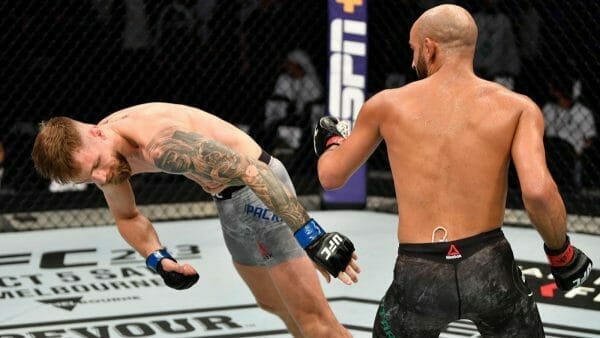There must be something in the air this IPO season, because Ultimate Fighting Championship (UFC) parent company Endeavor Group Holdings joins the ranks of WeWork, Lyft (LYFT.Q), Uber (UBER.NYSE) and Peloton Interactive (PTON.Q) as companies that have either stalled their IPO, cancelled it outright, or tanked badly shortly after.
In Endeavor’s case, today’s public offering did not go as they originally planned, and it’s a small wonder given the problems this company’s been facing lately, from labour disputes to balance sheet woes. The company says they haven’t abandoned their plants to go public, but instead cite “market conditions” as the reason.
Sure.
Endeavor was formed in 2009 from the union of the William Morris Agency and Endeavor Talent Agency, a boutique firm created by current CEO Ari Emanuel. In 2014, William Morris went on an acquisition spree taking over companies like sports and modelling agency IMG and the UFC two years later, among others.
Here’s some of their holdings:
- Endeavor (June 2016) Chinese subsidiary formed with the investments from Sequoia Capital, Tencent and FountainVest
- Miss Universe
- Frieze, fine arts and media company
- WME, the talent agency
- IMG, the sports, fashion and entertainment
- The Wall Group, stylists and designers
- UFC, mixed martial arts
- Professional Bull Riders
- Euroleague Basketball, a joint venture between IMG and the European hoops company
- ELEAGUE, an eSports joint venture with Turner
It seemed like a matter of time before they’d go public and strut their stuff in the public markets. They lined up such luminaries as Goldman Sachs, KKR&Co, JPMorgan Chase, Morgan Stanley, and Deutsche Bank to act as underwriters for the rollout. They company was anticipating to raise over $600 million during its initial public offering (IPO) today, and opening to the public with stock prices ranging between $30-32 per share.
What the hell happened?
Five unresolved lawsuits filed by a group of UFC fighters making antitrust claims and accusing the firm of shortchanging them happened.
They argue that their employer used anticompetitive practices to suppress wages. There is a good chance that a Las Vegas judge could give the nod to thousands of fighters to come forward with a class-action lawsuit against the company, said Paul Gift, a Pepperdine University business professor who studies the mixed martial arts economy.
In an SEC filing, Endeavor acknowledged that, between lawsuits filed by the WGA and UFC fighters, plaintiffs may seek recovery of “very large or indeterminate amounts” of money and the outcome “may remain unknown for substantial periods of time.”
There are also charges of union-busting levied against the company, as fighters have tried desperately to organize and the UFC have done everything in their power to block their attempts.
“WME’s stance is that the fighters are independent contractors,” said Jeff Borris, who in the past has represented Barry Bonds. “But if you analyze the situation, they’re employees. [The UFC] tells them when to fight, where to fight, and whom to fight. They tell them what they can wear … and also prevent them from fighting for other promotions.”
Does that sound familiar? It should. Uber and Lyft (and other gig economy companies) just got their asses handed to them in California over that kind of model. Except we might argue that the stakes are higher for UFC fighters than Uber drivers. Instead of occasionally sleeping in their car in between gigs, UFC fighters suffer brain trauma, and sacrifice so much more of their lives to make money for a company doesn’t give a shit about them.

As much as we’re all annoyed by the occasional lockout, every major sports league has a union to protect its employees. And if the UFC wants to be a big name among the already established major leagues, then it should damn well get one as well.
But despite their pretensions towards major league status, the UFC (and their parent company) have always been amateur hour, and their financials display that loud and clear.
The liability game
Normally, you’d think the parent company of the UFC would have built a bin Scrooge McDuck would be envious of, filled it with the gains from their pay per view empire, and gone for nightly swan-dives.
And you’d be wrong.
According to its prospectus, the company is highly leveraged, with long-term debt of $4.6 billion and total liabilities of $7 billion. It has tapped private equity and debt markets to fuel its expansion. The company had only $3.61 billion in revenue for 2018, an increase of $3.02 billion from the previous year.
The company’s operating loss came to $107 million with interest gobbling up $277 million.
That can’t be right. If that dollar amount were for the UFC alone, it would be suspect but that’s for the whole company with all of their clients.
Especially not when you consider what UFC president Dana White said in 2018:
“When you think about it we haven’t even scratched the surface yet of how big this thing can be. We just did a TV deal with ESPN for $1.5 billion for five years. Now the company is worth $7 billion.”
Granted, Dana White is probably one of the biggest shit-talkers this side of Don King, but you can’t walk a block in a Vancouver suburb, for example, without running into a bar advertising the next UFC PPV fight.
Where the hell is all of his money going?
It’s not like he’s paying his fighters.
—Joseph Morton

